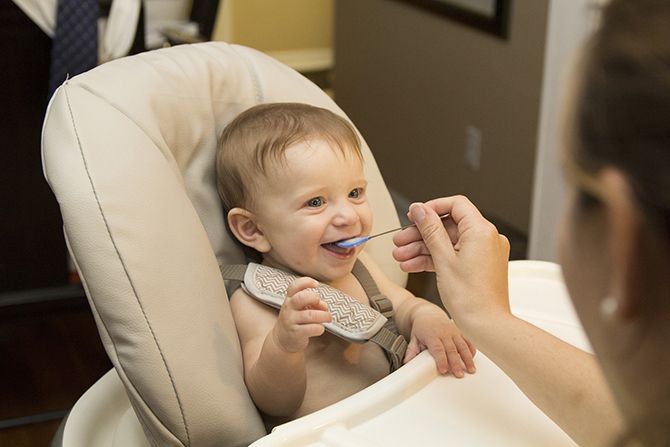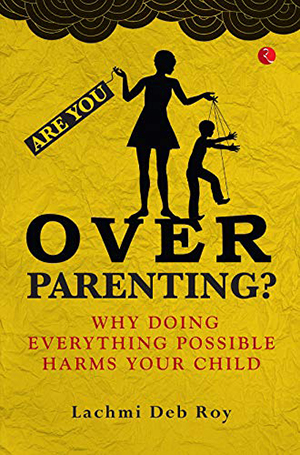We all want the same things for our children.
We want them to grow up to love and be loved, to follow their dreams, to find success.
Mostly, though, we want them to be happy.
But just how much control do we have over our children's happiness?
A must read from Lachmi Deb Roy's Are You Overparenting? Why Doing Everything Possible Harms Your Child.

Being a parent is one of the most difficult yet rewarding jobs on the planet.
Being responsible for another person may seem scary or overwhelming and may result in you overparenting your child.
You can avoid this by helping your child become mature, giving them some independence, helping them solve problems, and dealing with your own worries.
As parents, we should guide them in the right direction, respect their views as well and never overshadow them.
Sometimes, when our children are unhappy, we tend to overreact and try to make them feel okay.
If they are uncertain about their future, we may mistake this for deep insecurity and shower them with praise and assurance.
We always get worried if we sense the slightest discomfort in our children, and negative thoughts pour into our heads.
We keep questioning ourselves and we bog them down with more questions, and even if they are not worried, they tend to get irritated.
If our children are unhappy, we tend to overreact and try our best to lift their spirits.
If your child is unhappy, sit down and explain to them that everything doesn't happen the way they want.
Give your child time, and that is for sure going to help them.
But give them some free time to think about their life as well.
You will not be able to do any good to them if you try to bubble-wrap them from all hurdles of life.
Let them feel the scorching heat of the sun, let them cross rocky paths and let them feel the thorns under their feet, because that is the way they are going to learn.
We don't want to mess up our child's happiness, but we shouldn't mollycoddle them all the time, because that is the surest way of messing up their life.
We all want the same things for our children.
We want them to grow up to love and be loved, to follow their dreams, to find success.
Mostly, though, we want them to be happy.
But just how much control do we have over our children's happiness?
Ask any parent what they want for their child, and the unanimous answer would be 'Happiness!'
However, that's one state that cannot be controlled.
A recent research by psychologists at the University of Edinburgh and the Queensland Institute for Medical Research in Australia states that happiness can be inherited, which means that parents have a hand in ensuring the child grows up to be a happy child.
Here are some simple things that they should keep in mind while raising their children into happy and contented adults:

Happy children
Happy children are a product of happy homes.
Your state of mind, depression or happiness makes an impact on the child during conception.
When couples are happy, the possibility of conception is high.
A woman should always try to keep herself in a good mood during pregnancy, as a happy state of mind makes happy children.

Stay connected
For your child's lifelong emotional well-being, it is important that there is a close bond in the family.
In fact, they should be taught to connect with all the members in the house, including grandparents, cousins, friends, neighbours, domestic helps and pets.
Spend as much time as possible with your children and give them unconditional love.
Hug your children, hold them and appreciate them for their achievements.
Encourage them to socialize.
The more connections your child makes, the better it is for their development.

Happy parents raise happy children
It is important for parents to have a healthy, understanding relationship between themselves because it affects the psyche of their children.
It is not just about a parent's relationship with the child.
It is also about how happy the mother and the father are together as a couple.
The responsibility of parenting should be shared so that nobody feels the pressure.

Small gestures count
I try to remember all the time what is it that made us feel loved as children.
For me, it was always about having a great time with my mother, since I had a very detached father.
Probably that was his style of parenting.
Sometimes it was about holidays, sharing a few fun secrets and also sharing your dreams.
As parents, are we doing enough to make our children feel loved?
Very often, it is the little gestures that count.
One just needs to put in that little effort and time.

Switch off distractions
Turn off your smartphones or just keep them away from you.
When you get home after a long day at work or if you are a stay-at-home mom, when your children return from school, just give them a tight hug and talk to them about how their day was.
Discuss your day too.
Make it a fun conversation.
You don't need to fiddle with your mobile.
You just need to sit and be with them.
Don't answer any messages post eight o'clock in the night.

Dinner time, fun time
Make dinner time a fun event in the house, where both the parents and the children participate and talk about life in general, the happenings around the world, friends and more.
Turn off all gadgets and don't keep texting during meal times.
You can even talk about food and the dish that they enjoy eating the most, and why it is important to relish food, the importance of nutrition and a balanced diet.
Tell them why food wastage should be made a criminal offence because there are so many children around us who don't even get a single morsel of food to eat every day.

Show physical affection
Hug your child often.
If you want a happy child, always remember that children thrive on love and affection.
If a child is loved, they feel wanted, and this helps in developing their self-esteem.
You must have observed that children who come from happy families do not suffer from behavioural problems.
They are much more secure, as they feel their family is always with them.
If you have a young child who is not yet a teenager, shower them with loads of hugs and kisses.
But if you feel your teenage daughter or son is getting embarrassed with your hugging and kissing gestures, change your gestures.
Be generous with your teenagers with your praises, appreciation and use an affectionate tone when you are talking to them.

Bedtime should be precious
With young children, make bedtime a precious moment.
Remember, as your children grow older and step into teenage followed by adulthood, it is these moments that they are going to cherish throughout their life.
Read them a story from a book, or just cook it up yourself.
It is a beautiful feeling to see them drift off into sleep, and it is a unique bonding experience both for children and parents.
Storytelling during bedtime, or maybe anytime, helps them develop their imagination skills.

Treat all children equally
Spend quality time with each of your children.
Remember, children feel special and open up better when there is nobody about except the two of you.
You can involve them in any kind of activity, like playing a game of tennis, or reading a book together or just talking to each other.
It is during these times that you discover a lot about your child.
If you have two children, divide the time equally between them.
Do not neglect one child for the other.
They, at any cost, should not feel that their mother is being partial and loves one child more than the other.
Even if there are some grievances or complaints, they will be able to open up better to you that way.

Be a role model
Be careful how you speak to others in front of them and mind your language always.
Be polite, and no matter how worked-up or tired you are, remember your child is watching your actions.
So don't throw tantrums or be rude to your house helps.
Children always knowingly or unknowingly try to ape their parents.
When it comes to parenting, I have seen many parents being overtly competitive.
Don't be competitive; teach your child to just follow their heart and compete with themselves, and not others.

Involve your child in decision-making
It is also important to respect their decisions.
Don't just impose your views on them.
Ask them their opinion, what they feel about a certain thing.
It can be as simple as dressing up for a party.
Ask them what colour they wish to wear and if you wish to go colour-coordinated as a family, then also you should ask them about their choice of colour.
Sometimes they want their mothers and fathers to dress up in a certain way; sometimes you can keep their wish too, until and unless their expectations are completely bizarre.

Be spontaneous
Play with them as much as you can -- these can be unorganised games too.
Don't make them schedule slaves.
Children love to spend some unstructured time with their parents, when they can just laugh and play and relax.

Address their worries
Be there for your child when you feel something is bothering them, or they are unhappy.
There may be someone in school or hobby class, and sometimes even a teacher who is bullying them.
Try and take charge of the situation by spending time with them.
Show them that you care, and try and find out their cause of unhappiness and put them at ease.
Most importantly, try and find out the cause of your child's stress and who the people involved in it are.
Teach them life skills on how to deal with bullies.

10. Treasure their gifts
Children have beautiful ways of showing affection.
Sometimes they make cards or write poems for their parents.
You, as parents, in turn should show your happiness and treasure those gifts by hanging them on the soft board of your bedroom, attaching it with a magnet on the fridge.
These actions of yours give a great sense of achievement to the children.

Don't interrupt
When your child has a story to tell, just listen to them carefully.
Don't interrupt them.
The story can be a simple school event or an incident at the park or maybe a discussion with a friend.
No matter how busy you are, never ignore them.
If you do, chances are, they will never share any of the stories of their life with you.
Always encourage your children to speak their heart out and make sure you listen to them carefully.
Love and affection are the foundations of a happy child.

Excerpted from Are You Overparenting? Why Doing Everything Possible Harms Your Child by Lachmi Deb Roy, with the kind permission of the publishers, Rupa Publications India.











